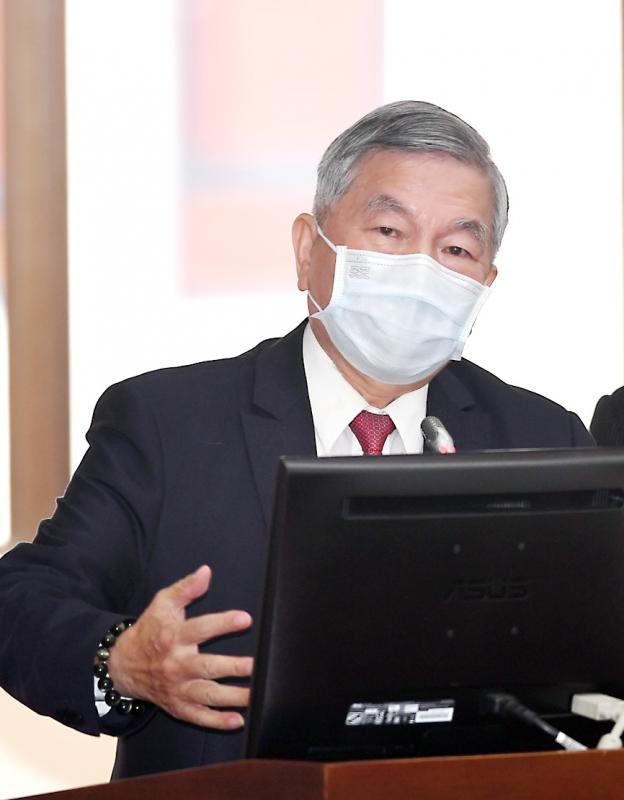Local medical equipment suppliers are soon to build a prototype of a ventilator to treat COVID-19 patients, Minister of Economic Affairs Shen Jong-chin (沈榮津) said yesterday.
Funding for the Ministry of Economic Affairs initiative is estimated at NT$50 million (US$1.67 million), which would come from the government’s expanded special budget that provides the ministry with an additional NT$77.44 billion, a report submitted to the legislature’s Finance Committee showed.
The ventilator, to be used for treating COVID-19 patients in a serious or critical condition, would be developed by local manufacturers based on a design by US medical device company Medtronic PLC, Shen told reporters prior to a committee meeting in Taipei.

Photo: CNA
Seeking to help nations combat the coronavirus, Medtronic last month publicly shared the design specifications of its Puritan Bennett 560 (PB560), a ventilator suited for a rapid manufacturing process.
“About 100 samples are to be built shortly, which would then be tested and certified,” Shen said, declining to give a more detailed time line.
Demand for ventilators for critically ill patients is high amid the global spread of the disease, making the domestic production of the devices an imminent need, as most manufacturers are in Europe and the US, Shen said.
Taiwanese manufacturers mainly produce positive-pressure ventilators for people with obstructive sleep apnea syndrome, while ventilators for critically ill patients are imported.
The project is headed by the government-funded Industrial Technology Research Institute (工研院), the ministry said.
“Our engineers are working on building a prototype along with local companies specializing in machinery sensors and components, as well as systems integration,” an institute official told the Taipei Times by telephone.
The official declined to confirm whether the ventilators would be based on Medtronic’s PB560.
The institute expects to hold a news conference next week to showcase the prototype, the official said.
Additional reporting by CNA

INVESTIGATION: The case is the latest instance of a DPP figure being implicated in an espionage network accused of allegedly leaking information to Chinese intelligence Democratic Progressive Party (DPP) member Ho Jen-chieh (何仁傑) was detained and held incommunicado yesterday on suspicion of spying for China during his tenure as assistant to then-minister of foreign affairs Joseph Wu (吳釗燮). The Taipei District Prosecutors’ Office said Ho was implicated during its investigation into alleged spying activities by former Presidential Office consultant Wu Shang-yu (吳尚雨). Prosecutors said there is reason to believe Ho breached the National Security Act (國家安全法) by leaking classified Ministry of Foreign Affairs information to Chinese intelligence. Following interrogation, prosecutors petitioned the Taipei District Court to detain Ho, citing concerns over potential collusion or tampering of evidence. The

‘FORM OF PROTEST’: The German Institute Taipei said it was ‘shocked’ to see Nazi symbolism used in connection with political aims as it condemned the incident Sung Chien-liang (宋建樑), who led efforts to recall Democratic Progressive Party (DPP) Legislator Lee Kun-cheng (李坤城), was released on bail of NT$80,000 yesterday amid an outcry over a Nazi armband he wore to questioning the night before. Sung arrived at the New Taipei City District Prosecutors’ Office for questioning in a recall petition forgery case on Tuesday night wearing a red armband bearing a swastika, carrying a copy of Adolf Hitler’s Mein Kampf and giving a Nazi salute. Sung left the building at 1:15am without the armband and apparently covering the book with a coat. This is a serious international scandal and Chinese

Seventy percent of middle and elementary schools now conduct English classes entirely in English, the Ministry of Education said, as it encourages schools nationwide to adopt this practice Minister of Education (MOE) Cheng Ying-yao (鄭英耀) is scheduled to present a report on the government’s bilingual education policy to the Legislative Yuan’s Education and Culture Committee today. The report would outline strategies aimed at expanding access to education, reducing regional disparities and improving talent cultivation. Implementation of bilingual education policies has varied across local governments, occasionally drawing public criticism. For example, some schools have required teachers of non-English subjects to pass English proficiency

TRADE: The premier pledged safeguards on ‘Made in Taiwan’ labeling, anti-dumping measures and stricter export controls to strengthen its position in trade talks Products labeled “made in Taiwan” must be genuinely made in Taiwan, Premier Cho Jung-tai (卓榮泰) said yesterday, vowing to enforce strict safeguards against “origin laundering” and initiate anti-dumping investigations to prevent China dumping its products in Taiwan. Cho made the remarks in a discussion session with representatives from industries in Kaohsiung. In response to the US government’s recent announcement of “reciprocal” tariffs on its trading partners, President William Lai (賴清德) and Cho last week began a series of consultations with industry leaders nationwide to gather feedback and address concerns. Taiwanese and US officials held a videoconference on Friday evening to discuss the